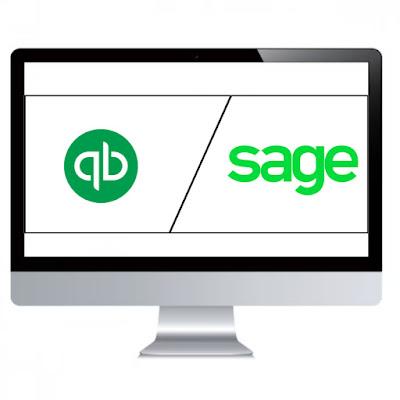
As a business owner, choosing the right accounting software is crucial to keep your finances in order and streamline your operations. Two of the most popular options in the market are QuickBooks and Sage. Both offer an array of features and functionalities that can help you manage your books effectively. But which one is better suited for your business needs? In this comprehensive review, we'll compare QuickBooks vs Sage head-to-head, weighing their pros and cons to help you make an informed decision. So buckle up as we take a closer look at these two powerful tools!
Introducing QuickBooks vs Sage
The QuickBooks vs Sage both are two of the most popular accounting software in the market today. QuickBooks, developed by Intuit, is a cloud-based platform that caters to small and medium-sized businesses. It offers an array of features like invoicing, expense tracking, payroll management, inventory tracking and more.
On the other hand, Sage has been around for over 30 years and is known for its robust enterprise-level solutions. It provides a range of products from accounting to financial management systems suitable for different business sizes.
While both platforms offer similar features such as bookkeeping tools and reporting capabilities, they differ in their approach to pricing plans. QuickBooks has subscription-based pricing while Sage offers perpetual licenses with additional fees for upgrades.
Another notable difference between the QuickBooks vs Sage is their user interface – QuickBooks takes on a more modern design compared to Sage's traditional look.
Both platforms have proven themselves valuable assets in managing finances effectively. The choice ultimately depends on your business needs - whether you're looking for affordability or scalability- there's something available from these top players in accounting software!
Comparing QuickBooks vs Sage
When it comes to choosing the right accounting software for your business, there are many options available in the market. However, two of the most popular and widely used platforms are QuickBooks and Sage.
QuickBooks is one of the most recognized names in small business accounting software. It offers a suite of financial tools that help you manage expenses, track sales and automate bookkeeping tasks with ease. On the other hand, Sage is known for its powerful features and advanced reporting capabilities.
One major difference between QuickBooks vs Sage is their pricing structure. While both offer various plans at different price points, QuickBooks tends to be more affordable for smaller businesses while Sage can be more suitable for larger companies with complex accounting needs.
In terms of user-friendliness, QuickBooks has a simple interface that's easy to navigate even if you have little or no experience in using accounting software. Meanwhile, Sage requires some learning curve due to its vast range of features and functionalities.
Another area where these two platforms differ significantly is in their customer support services. While both offer online resources like FAQs and tutorials as well as email support; only Quickbooks provides phone-based customer support which may prove crucial when troubleshooting any issues quickly.
Deciding between QuickBooks vs Sage will ultimately depend on your specific business needs such as size scale operations complexity level budget among others
Pros and Cons of QuickBooks vs Sage
When it comes to choosing between QuickBooks and Sage, each accounting software has its own set of advantages and disadvantages that you should consider. Let's take a closer look at the pros and cons of each platform.
Firstly, QuickBooks is known for its user-friendly interface, making it easy to navigate even for non-accountants. It offers an impressive range of features including invoicing, payroll management and inventory tracking. Additionally, QuickBooks can integrate with other third-party apps such as PayPal or Shopify which makes your accounting tasks more efficient.
On the other hand, Sage boasts advanced financial reporting functions that offer greater flexibility than QuickBooks’ report templates. It also provides more customizability when creating invoices or estimates compared to the limited options available in QuickBooks.
However, both platforms have their limitations too. For instance, some users find QuickBooks' customer support services unresponsive while others may dislike Sage's steep learning curve due to its complex functionality.
Ultimately, deciding between these two accounting software boils down to your specific business needs and preferences. So make sure you weigh up all options before making a decision!
Which is the better accounting software?
When it comes to deciding which accounting software is better - QuickBooks or Sage - the answer is not black and white. It ultimately depends on individual needs and preferences.
QuickBooks offers a user-friendly interface with easy-to-navigate features, making it ideal for small business owners who are new to accounting software. Its invoicing system also allows for customization, so businesses can tailor their invoices to fit their brand.
On the other hand, Sage offers more advanced features including multi-currency support and inventory management, making it an excellent choice for larger businesses that require more complex bookkeeping solutions. Its reporting capabilities are also highly praised by users.
Both QuickBooks and Sage offer cloud-based options, allowing users to access their accounts from anywhere with an internet connection. However, Sage's cloud-based option does come at a higher cost than QuickBooks'.
Ultimately, the decision between QuickBooks vs Sage comes down to what features your business requires and how comfortable you are navigating each platform. It's important to do thorough research before choosing one over the other as both have their own strengths and weaknesses.
Alternatives to QuickBooks and Sage
While QuickBooks and Sage are two of the most popular accounting software options on the market, there are several other alternatives worth considering.
One such alternative is Xero, which offers similar features to both QuickBooks and Sage with a user-friendly interface. It also allows for unlimited users at no additional cost.
Another option is FreshBooks, which caters more towards freelancers and small businesses with its simplified invoicing system and time tracking capabilities.
For those in need of industry-specific software, there's Zoho Books. This cloud-based accounting platform offers customized solutions for different industries such as construction or healthcare.
If you're looking for a free option, Wave Accounting may be the way to go. While it lacks some advanced features found in other platforms like inventory management, it still provides basic bookkeeping tools without any cost to the user.
Ultimately, when choosing an accounting software alternative to QuickBooks or Sage, consider your specific business needs and budget before making a decision.
Conclusion
After comparing QuickBooks and Sage, it is clear that both accounting software have their own unique features and functionalities. While QuickBooks offers an intuitive interface for small businesses, Sage provides more advanced capabilities for larger enterprises.
Ultimately, the decision between QuickBooks vs Sage will depend on your business needs and preferences. It's important to evaluate both options carefully before making a final decision.
However, if you're looking for alternatives to these accounting software programs, there are several other options available in the market such as Xero or Zoho Books. These may offer different features that could better suit your business requirements.
When choosing an accounting software program like QuickBooks vs Sage, make sure to consider factors such as user-friendliness, cost-effectiveness and scalability. With proper evaluation of all aspects involved in both systems along with any potential alternatives at hand should give you a clearer idea of which best fits your company’s needs.

